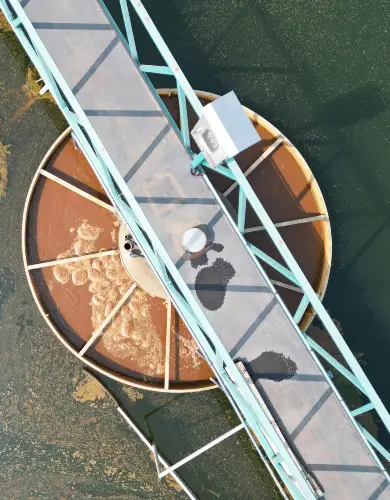A guide to gap sites
Here at AquaSwitch, our mission is to make the water industry more understandable for businesses in Britain. Have you recently come across the term ‘gap site’? here’s our guide explaining what this means and how it may affect your business.
What is a gap site?
A gap site is a property connected to the water network that uses water but is not being billed by a business water supplier. This can occur for one of the following reasons:
- The property is erroneously marked as disconnected on the water supply network system.
- The property has been newly connected to the water supply network, but it hasn’t been allocated a supply point on the water supply network system.
- The property was illegally connected to the water network when it was first built.
- A property was split into two separate supply points, but the new meter was never registered with the water supply network.
The water industry sometimes refers to gap sites as ‘missing properties’.
How many gap sites are there?
Well, there’s no easy answer to this. If the water network knew where the gap sites were, they could fix the problem. We know that the regulator reports that the UK water network has 3 billion litres of missing water each day.
That’s the equivalent of over 1,000 Olympic size swimming pools, or about the same capacity as this picturesque reservoir in Lancaster. This missing water can be attributed to either leaking pipes in the water network or from gap sites using water that is never recorded.
In short, the number of gap sites is large and is a significant problem for the water industry.
Why do gap sites not get identified and fixed?
You would naturally think that the companies that operate the water networks (wholesalers) would make sure that all properties using water are paying for it.
Well, weirdly, that doesn’t happen, and here’s why:
The regional wholesaler is a private company that owns and operates the water network in a certain region of the country. The wholesaler calculates household water rates and business water rates for properties in their region on a cost-plus basis.
To calculate how much to bill for each property, the wholesaler takes all the costs involved in maintaining the network, adds a profit that the regulator agrees, then allocates this across all the properties it knows about in its region.
When the wholesaler identifies a gap site, it doesn’t increase its profit; instead, it has the effect of lowering the cost of water for all the other properties in that region. The only benefit the wholesaler gets from finding these missing properties is improving the network’s leakage statistics.
What are the regulators doing about gap sites?
In Ofwat’s delivering water 2020 paper, Ofwat reviewed the incentives for wholesalers to identify gap sites and concluded that there is not a sufficient incentive in the water industry for this issue to be fixed.
The review concluded that Ofwat would intervene in the gap sites process by requiring the wholesalers to come up with bespoke performance commitments regarding the identification of gap sites.
Since then, six regional wholesalers have signed up for a gap site scheme that incentivises the business water suppliers to identify and take on new customers in gap site properties.
I’ve recently been contacted to say my property is a gap site; what should I do?
The first step is to assess whether your business property is really a gap site. To recap, your business is a gap site if:
- You are currently using water and wastewater services.
- You are not being billed for any of these services.
If you believe you’ve been wrongly identified as a gap site, we recommend ringing the water company that has written to you explaining the situation. The water company will be able to update its records accordingly. This process may involve a physical inspection of your property.
Your local water wholesaler will bill you if you agree you are a gap site and your property is a household.
If you agree you are a gap site and your property is not a household, then it is necessary for you to sign up with a business water supplier. You can choose your business water suppliers from our latest guide.
When you have chosen a supplier, then reach out to their customer services department, who will be able to onboard you as a customer and arrange for your business to be allocated a supply point ID.
When you are onboarded, you will not receive any backdated charges; you will only commence paying for water from the point your property is registered with the water network.
If you don’t take any action, the wholesaler will allocate you a business water supplier themselves. Given the varying tariffs and levels of customer services for water suppliers, we recommend choosing the right supplier for your business.
I believe my property is a gap site, but no one has contacted me?
Given the number of gap sites across the country and the limited incentives to fix them, this is a common situation.
We recommend a proactive approach and that you contact a business water supplier to explain the situation. A business water supplier will be able to arrange for your business to be registered with the water network and will be able to onboard your business as a customer.
First, refer to our guide on finding out who is your water supplier.
Why can’t AquaSwitch deal with my gap site?
Unfortunately, within the water market regulations, only a wholesaler or a supplier can initiate adding or amending the record of a supply point. If there is no supply point, we don’t have any information to be able to prepare a water quote tailored to your business.
This means we are not able to facilitate the introduction to a new supplier or help you compare the prices of different suppliers.
My property is being used by a business but is being billed by a household supplier.
This is another common situation that sometimes comes under the umbrella of a ‘gap site’.
If your business property is being billed as a household, you cannot benefit from the deregulated market. This means you will continue to be billed by your regional wholesaler. This is a frequent occurrence in the tourism industry where homes are converted into holiday lets.
In the deregulated water market, you are able to switch business water suppliers and benefit from lower water rates and improved customer service.
If you believe you can benefit from the open water market, it will be necessary to reach out to a business water supplier to request that they take you on as a new customer.
Check out our article business and domestic water rates.

